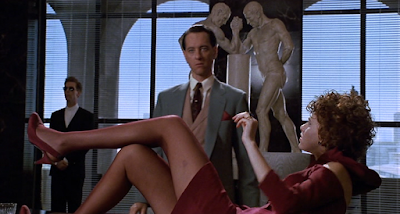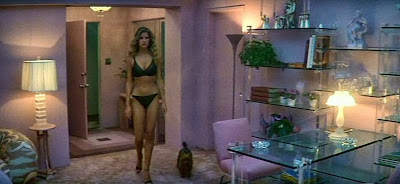While it's not quite Heathers 2, Hudson Hawk is, by far, the only film that I've come across that comes anywhere close to doing a half decent job of capturing Sandra Bernhard's face-melting beauty in a manner I would deem satisfactory. What's that? Why did I compare this action-adventure film to the non-existent sequel to Heathers? Oh, because it's directed by Michael Lehmann and co-written by Daniel Waters. Now, it's easy to dismiss the film's Michael Lehmann did after Heathers (40 Days and 40 Nights... ugh). But the fact that Daniel Waters (Happy Campers), the reason Heathers is remembered so fondly to this day, is involved caused me to think that their follow up might be just as magical. (You are aware that the film stars Bruce Willis and Andie MacDowell, right?) Yeah, I'm aware. However, the prospect of watching Sandra Bernhard and Richard E. Grant spew campy/mildly glib dialogue that was written by Daniel Waters piqued my interest. Sure, it took me over twenty years for my interest to get so piqued that I actually sat down and watched it from start to finish. But still, better late than never. (Are you sure it isn't "peaked"?) Nah, I think it's "piqued." Anyway, on top of boasting Sandra Bernhard at the height of her sexiness (she lounges in a leggy manner at one point while listening to "The Power" by Snap! on a Walkman - I know, 'nuff said), the film features David Caruso in Andie MacDowell drag and...
(Stop right there. You need to back the fuck up. Did you say, David Caruso in Andie MacDowell drag?) Yep. (Call me a sexually confused armadillo, but my genitals just exploded.) Is that a good thing? (Oh, you better believe it's a good thing.) Okay. But I should warn you, David Caruso is only in Andie MacDowell drag for about ten seconds.
Personally, I would have cast David Caruso as Anna Baragli, a nun who works undercover for The Vatican, and would have cast Andie MacDowell as... well, I wouldn't have cast her in the first place... you know, because she sucks. But that's neither here nor there. I think most people will agree that David Caruso would have been amazing as this film's Andie MacDowell-esque romantic lead.
As I was saying.... On top of Sandra Bernhard at the height of sexiness and David Caruso in Andie MacDowell drag, what else does this film got going for it? Damn, that's a good question. Maybe I should have thought this through.
Oh, if you mention a song to Bruce Willis' titular character, he'll tell you its exact running time. (Huh?) Let's say someone blurts out the title of a song, like, oh, I don't know, "Rhythm Is a Dancer" by Snap!, he would say, without much hesitation, five minutes, thirty-two seconds. It's a cute character trait. And it kept things interesting while we waited for Sandra Bernhard to show up.
The same can be said for Bruce Willis' obsession with cappuccino, his beverage of choice. Which he can never seem to enjoy in peace (circumstances beyond his control always seem to interfere just as he's about to take his first sip).
What else? Um. You know what? Until I come up with some other things I liked about this film, here's a brief-ish recap of the film's plot.
All set on becoming a spatula salesmen upon being released from prison, cat burglar extraordinaire Hudson Hawk (Bruce Willis) is immediately harassed by mobsters and other underworld types who want to exploit his unique talents for they're own personal gain. Teaming up with his partner in crime, Tommy Five-Tone (Danny Aiello), Hudson's first job involves stealing Da Vinci's Sforza, a horse statue.
Oh, and instead of showing Hudson and Tommy simply steal a statue, they have them do so while singing "Swinging on a Star." Which, I'll admit, was somewhat entertaining. It definitely put a new twist on the cliched movie heist sequence.
For reasons that escape me at the moment, the action quickly moves to Rome, where Hudson Hawk is embroiled in a conspiracy to steal even more Da Vinci artifacts. Working simultaneously for the C.I.A. (lead by James Coburn) and two self-described super-villains named Darwin (Richard E. Grant) and Minerva Maryflower (Sandra Bernhard), Hudson Hawk constantly struggles to keep the two groups off his back as he tries to woo Andie MacDowell, a Vatican spy masquerading as a tour guide.
If he can't woo Andie MacDowell, he can always settle for David Caruso in Andie MacDowell drag. Playing a C.I.A. agent called "Kit Kat" (his fellow agents are all named after candy bars), David Caruso's character is a master of disguise and can be seen in multiple disguises throughout the film. My favourite, of course, being his Andie MacDowell costume.
Speaking of costumes, legendary 1980s costume designer Marilyn Vance (Some Kind of Wonderful, Streets of Fire, Fast Times, etc.) has a field day sheathing Sandra Bernhard's lithe frame in a series of killer frocks.
Wearing a total of five outfits (six, if you include the bondage get-up she can be seen wearing in a slideshow), Sandra Bernhard wears wide brimmed hats, turbans, and funky earrings. And dresses that expose her collarbone and rib cage.
(What about her legs?) Relax, I'm getting to those.
Never not the focal point of the five scenes she's in, director Michael Lehmann does an admirable job of making sure Sandra Bernhard's yummy stems are always on display. Which, according to my logic, is reason enough to recommend Hudson Hawk.
Now, I know this film was ravaged by critics and a box office flop when it hit theatres in 1991. But I can't help the masses of the early 1990s had no clue how to properly appreciate the off-kilter splendour that is Sandra Bernhard. Seriously, though, her character's sort of heterosexual relationship with Richard E. Grant is a wonder to behold. In fact, if I was a studio exec, I would have said, fuck the box office, we're green-lighting a spin-off about the wacky adventures of Darwin and Minerva Mayflower and Bunny, their ball-obsessed dog. In conclusion... (Thank God.) the movie isn't as terrible as I thought it would be. Which, I guess, is a good thing.

























































































































